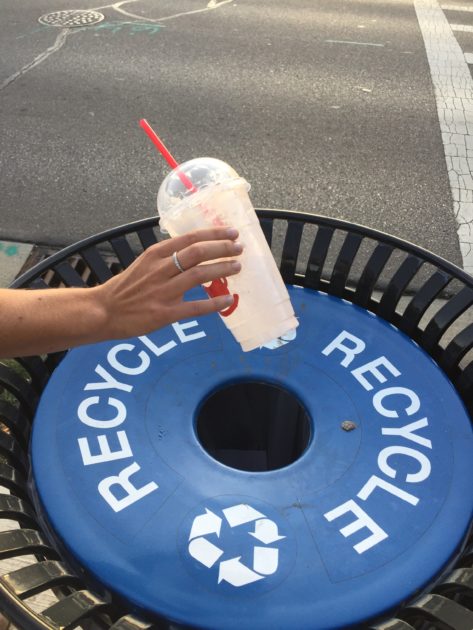According to National Geographic, almost a million plastic beverage bottles are sold every minute around the world.
Sometimes, though, that iced mocha from Starbucks is the only thing keeping you awake through your Quantitative Reasoning class, and after all, you tossed the plastic cup into the recycling bin on your way out the door.

But throwing an unrinsed plastic container into the recycling actually harms the environment, according to University Sustainability Intern Youting Chen.
Waste Management, the university’s recycling service provider, asserts that, “One dirty product, or one with food waste still in it, can contaminate an entire bale, containing thousands of pounds of collected plastics.”
These ‘contaminated’ recyclables head to a landfill instead of being processed for reuse.
Since the presence of any food scraps taints an entire bin of recyclables, that Starbucks cup — still bearing traces of caramel syrup and whipped cream — polluted an entire dumpster of otherwise recyclable products. Pizza boxes are another repeat offender, as grease is almost always absorbed into the cardboard.
Waste Management processes all of the university’s recycling, collecting from five locations four times a week. When a contaminated bin is found, which Chen says happens weekly at least, the company charges the university a $300 service fee.

“The cheapest way [to handle the situation] would be to take away all of the recycle bins and dump it all as trash, but that’s not our plan, because we want to be a green campus,” Chen said.
Instead, the Facilities Management Office is working to educate students on responsible recycling, and as is often found in our modern world, there’s an app to help.
Wastify, an app that was created by a Seattle student and won the U.S. House of Representatives 2018 Congressional App Challenge, instantly categorizes waste. It also informs you of the proper steps to take to dispose of the item, whether trash or recycling, and provides information on the closest facilities. A version is available for free on the App Store, although it has not been adapted on Google Play.
Ultimately, when it comes to recycling, “Cleanliness is essential,” as Waste Management’s “What Can I Recycle?” resource states. Even just a cursory rinse in the bathroom sink is enough to save tons of recycling, conserving energy and resources.


